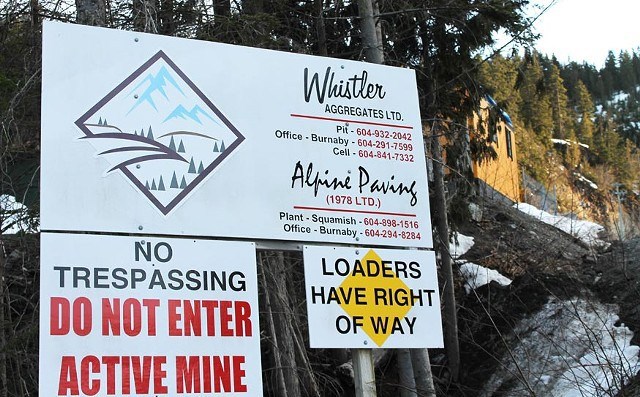Can an asphalt plant coexist with a residential neighbourhood?
Frank Silveri, owner of Whistler Aggregates Ltd., which has applied for a 30-year lease renewal to its gravel quarry licence in Cheakamus Crossing, believes it can.
"I don't think we're doing anything wrong. I don't think we're polluting or anything like that. I think we're following all the rules and regulations of the province and basically meeting or surpassing them, really," Silveri said.
"Down in the Lower Mainland, the plants are within 100 feet (30 metres) of people living, offices and things like that... and up there we don't even use 10 per cent of what the plants down here produce."
But in the view of residents of Cheakamus Crossing — and the Resort Municipality of Whistler (RMOW) itself — the heavy industrial use no longer fits in the neighbourhood.
The truck traffic, the dust and the noise from crushing rock or backup beepers are just a few reasons the plant should move, said Cheakamus resident Tim Koshul.
"There's lots of opposition around North America against asphalt plants, and just because they're 100 feet from somebody doesn't mean that person is happy about it," he said.
"There's a lot of heavy industry that used to be really close to people that is no longer there, and there is a reason for it."
Silveri argues that the plant can't be moved, either physically ("You don't relocate a plant. It's not like a lawnmower," he said) or legislatively ("That's the only place, I think in Whistler, that it's zoned that you can have an asphalt plant") — and as a businessman he's invested millions into his operation, which he's owned for more than 20 years.
With the profits he's projecting to make under his new lease application, Silveri feels the RMOW needs to make it worth his while.
"I've invested all this money, and now you're asking me to move. Just get the hell out... it's different if the guy can say, 'listen, I'll give you $5 million or something and then get the hell out of here," he said.
"It's just like when you're buying out a contract, you know? To make it worthwhile for someone, be reasonable. I'm just putting that out, something like that, you could probably sit down and talk. But for somebody to say just get the hell out?"
At its March 7 meeting, Whistler council passed a resolution stating its opposition to the renewal to the provincial Ministry of Forests, as well as one asking that, if the tenure is to be renewed, the term be reduced to one year instead of 30, and that the boundary be modified to increase the tree buffer and operational setback from the residential neighbourhood next door.
On March 13, Whistler Mayor Nancy Wilhelm-Morden said the RMOW might be willing to discuss some kind of financial compensation, "but if one side won't talk to the other side, it's kind of difficult to negotiate," she said, noting that Silveri hasn't been receptive to meetings with the RMOW.
The mayor wouldn't ballpark a dollar figure, but said she doesn't buy the million-dollar estimates floated by Silveri.
"We've talked to other people about the cost of relocating an asphalt plant, and it's not that onerous," she said. "(Any compensation) would have to be reasonable and justifiable."
Nor does she buy Silveri's other arguments.
"It's a mobile asphalt plant — by definition you can move it," she said, adding that Silveri owns a gravel pit at the Green River crossing north of Whistler.
"In addition, at the Cheakamus Crossing site, as far as the asphalt plant is concerned, he trucks in all of the materials to make the asphalt," she said.
"There's nothing native to that site that he uses for the manufacturing of asphalt, so there's no reason for that plant to be there."
The Ministry of Forests had received 45 pieces of correspondence regarding the application as of March 15.
With more housing and recreation planned for the Cheakamus area in the coming years, the time is right to move the plant, Koshul said.
"I see the increase at the Trainwreck (trail) and the people walking down there and the kids — it's not a good mix right now and it's just going to get worse," he said.
"I really wouldn't like to see it for another year, and I don't think the neighbourhood would, and if this is our chance to right a wrong, then this is our chance."




